BBC Case Study: Organisational Behaviour, Culture, and Motivation
VerifiedAdded on 2023/02/02
|11
|3810
|66
Report
AI Summary
This report provides a comprehensive analysis of organisational behaviour within the British Broadcasting Corporation (BBC). It explores the influence of organisational culture, power dynamics, and political behaviour on employees and management. The report delves into Handy's typology and Hofstede's cultural dimensions to understand the BBC's cultural landscape. It examines the impact of power structures using French and Raven's power theory, and addresses political behaviour within the organisation. Furthermore, the report investigates content and process theories of motivation, including Maslow's hierarchy of needs and Vroom's expectancy theory, to assess how the BBC can enhance employee motivation. It also discusses different types of teams and applies Tuckman's theory of team development to illustrate how effective teams function within the BBC. The analysis highlights challenges such as gender pay gaps, ineffective policies and lack of employee rewards, and suggests improvements for fostering a positive and productive work environment. This report provides a valuable case study of organisational behaviour principles applied to a real-world context.
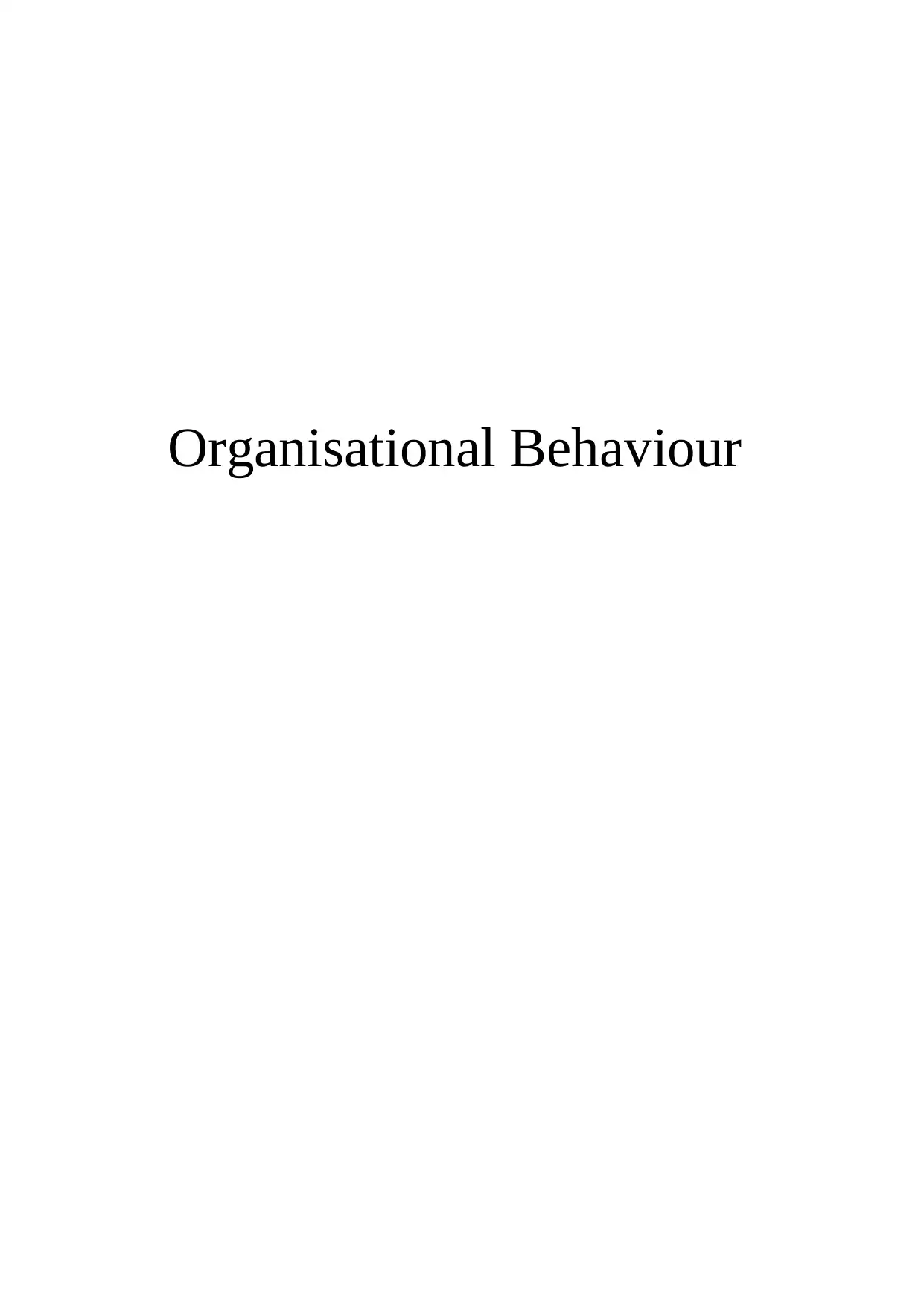
Organisational Behaviour
Paraphrase This Document
Need a fresh take? Get an instant paraphrase of this document with our AI Paraphraser
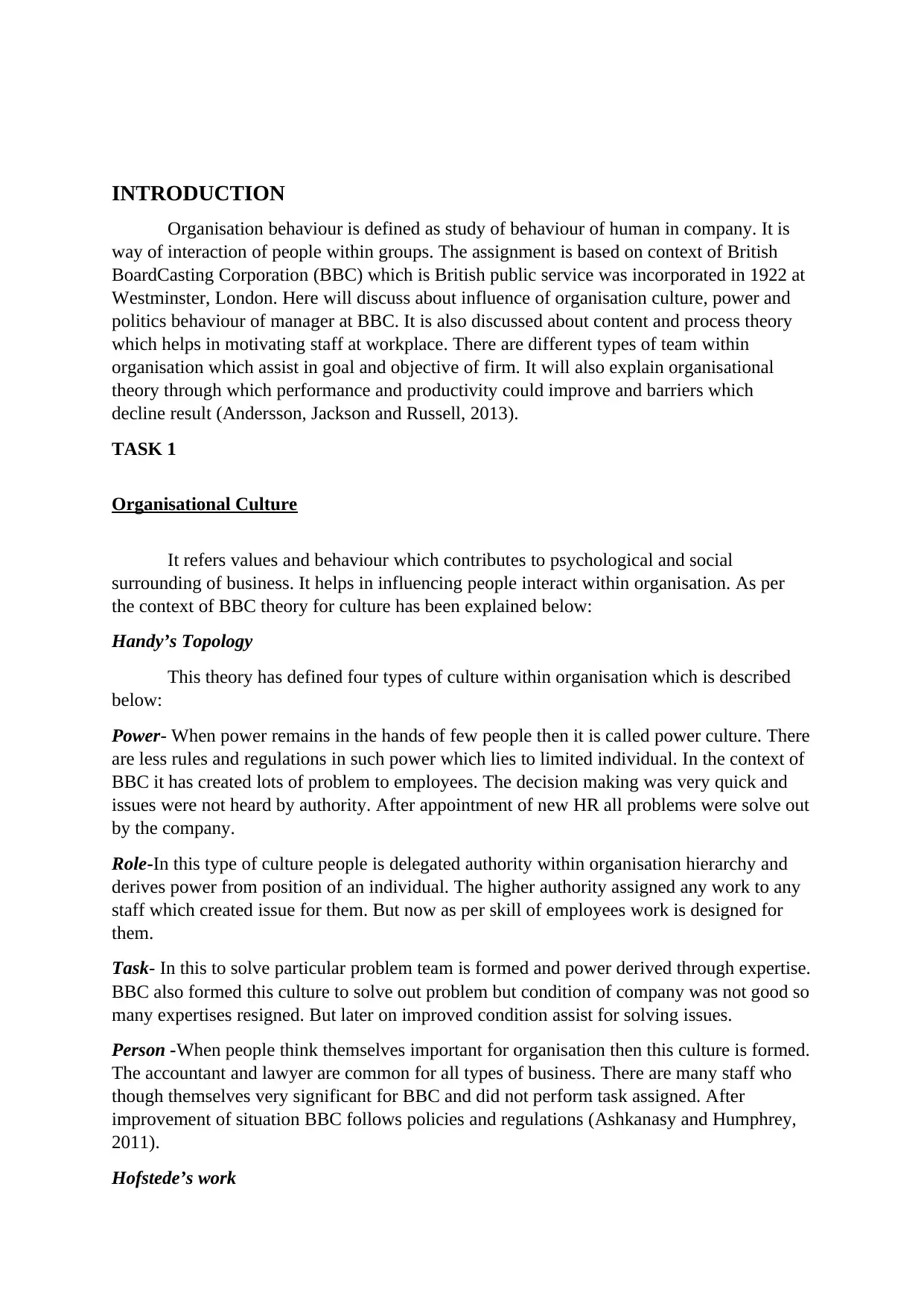
INTRODUCTION
Organisation behaviour is defined as study of behaviour of human in company. It is
way of interaction of people within groups. The assignment is based on context of British
BoardCasting Corporation (BBC) which is British public service was incorporated in 1922 at
Westminster, London. Here will discuss about influence of organisation culture, power and
politics behaviour of manager at BBC. It is also discussed about content and process theory
which helps in motivating staff at workplace. There are different types of team within
organisation which assist in goal and objective of firm. It will also explain organisational
theory through which performance and productivity could improve and barriers which
decline result (Andersson, Jackson and Russell, 2013).
TASK 1
Organisational Culture
It refers values and behaviour which contributes to psychological and social
surrounding of business. It helps in influencing people interact within organisation. As per
the context of BBC theory for culture has been explained below:
Handy’s Topology
This theory has defined four types of culture within organisation which is described
below:
Power- When power remains in the hands of few people then it is called power culture. There
are less rules and regulations in such power which lies to limited individual. In the context of
BBC it has created lots of problem to employees. The decision making was very quick and
issues were not heard by authority. After appointment of new HR all problems were solve out
by the company.
Role-In this type of culture people is delegated authority within organisation hierarchy and
derives power from position of an individual. The higher authority assigned any work to any
staff which created issue for them. But now as per skill of employees work is designed for
them.
Task- In this to solve particular problem team is formed and power derived through expertise.
BBC also formed this culture to solve out problem but condition of company was not good so
many expertises resigned. But later on improved condition assist for solving issues.
Person -When people think themselves important for organisation then this culture is formed.
The accountant and lawyer are common for all types of business. There are many staff who
though themselves very significant for BBC and did not perform task assigned. After
improvement of situation BBC follows policies and regulations (Ashkanasy and Humphrey,
2011).
Hofstede’s work
Organisation behaviour is defined as study of behaviour of human in company. It is
way of interaction of people within groups. The assignment is based on context of British
BoardCasting Corporation (BBC) which is British public service was incorporated in 1922 at
Westminster, London. Here will discuss about influence of organisation culture, power and
politics behaviour of manager at BBC. It is also discussed about content and process theory
which helps in motivating staff at workplace. There are different types of team within
organisation which assist in goal and objective of firm. It will also explain organisational
theory through which performance and productivity could improve and barriers which
decline result (Andersson, Jackson and Russell, 2013).
TASK 1
Organisational Culture
It refers values and behaviour which contributes to psychological and social
surrounding of business. It helps in influencing people interact within organisation. As per
the context of BBC theory for culture has been explained below:
Handy’s Topology
This theory has defined four types of culture within organisation which is described
below:
Power- When power remains in the hands of few people then it is called power culture. There
are less rules and regulations in such power which lies to limited individual. In the context of
BBC it has created lots of problem to employees. The decision making was very quick and
issues were not heard by authority. After appointment of new HR all problems were solve out
by the company.
Role-In this type of culture people is delegated authority within organisation hierarchy and
derives power from position of an individual. The higher authority assigned any work to any
staff which created issue for them. But now as per skill of employees work is designed for
them.
Task- In this to solve particular problem team is formed and power derived through expertise.
BBC also formed this culture to solve out problem but condition of company was not good so
many expertises resigned. But later on improved condition assist for solving issues.
Person -When people think themselves important for organisation then this culture is formed.
The accountant and lawyer are common for all types of business. There are many staff who
though themselves very significant for BBC and did not perform task assigned. After
improvement of situation BBC follows policies and regulations (Ashkanasy and Humphrey,
2011).
Hofstede’s work
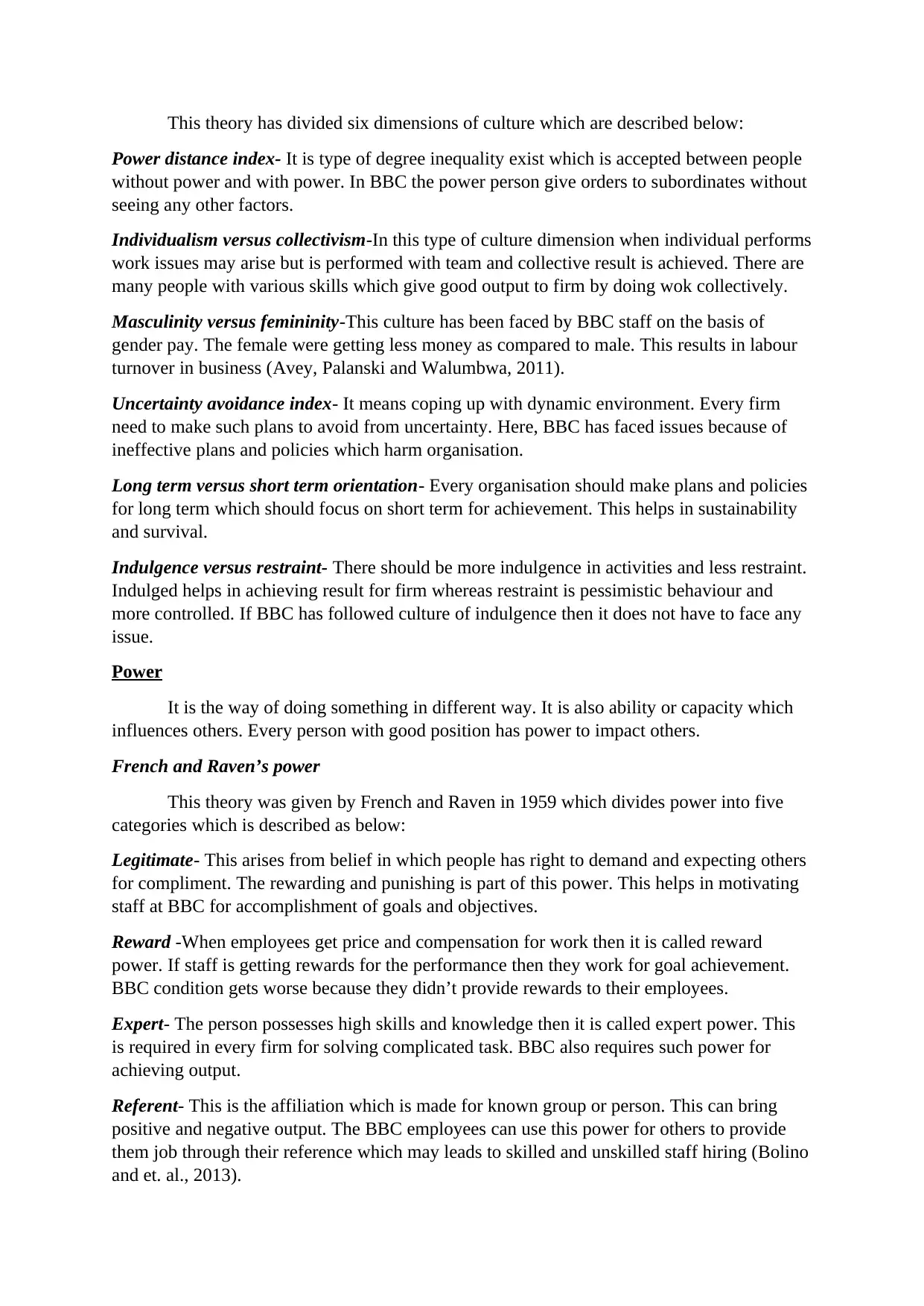
This theory has divided six dimensions of culture which are described below:
Power distance index- It is type of degree inequality exist which is accepted between people
without power and with power. In BBC the power person give orders to subordinates without
seeing any other factors.
Individualism versus collectivism-In this type of culture dimension when individual performs
work issues may arise but is performed with team and collective result is achieved. There are
many people with various skills which give good output to firm by doing wok collectively.
Masculinity versus femininity-This culture has been faced by BBC staff on the basis of
gender pay. The female were getting less money as compared to male. This results in labour
turnover in business (Avey, Palanski and Walumbwa, 2011).
Uncertainty avoidance index- It means coping up with dynamic environment. Every firm
need to make such plans to avoid from uncertainty. Here, BBC has faced issues because of
ineffective plans and policies which harm organisation.
Long term versus short term orientation- Every organisation should make plans and policies
for long term which should focus on short term for achievement. This helps in sustainability
and survival.
Indulgence versus restraint- There should be more indulgence in activities and less restraint.
Indulged helps in achieving result for firm whereas restraint is pessimistic behaviour and
more controlled. If BBC has followed culture of indulgence then it does not have to face any
issue.
Power
It is the way of doing something in different way. It is also ability or capacity which
influences others. Every person with good position has power to impact others.
French and Raven’s power
This theory was given by French and Raven in 1959 which divides power into five
categories which is described as below:
Legitimate- This arises from belief in which people has right to demand and expecting others
for compliment. The rewarding and punishing is part of this power. This helps in motivating
staff at BBC for accomplishment of goals and objectives.
Reward -When employees get price and compensation for work then it is called reward
power. If staff is getting rewards for the performance then they work for goal achievement.
BBC condition gets worse because they didn’t provide rewards to their employees.
Expert- The person possesses high skills and knowledge then it is called expert power. This
is required in every firm for solving complicated task. BBC also requires such power for
achieving output.
Referent- This is the affiliation which is made for known group or person. This can bring
positive and negative output. The BBC employees can use this power for others to provide
them job through their reference which may leads to skilled and unskilled staff hiring (Bolino
and et. al., 2013).
Power distance index- It is type of degree inequality exist which is accepted between people
without power and with power. In BBC the power person give orders to subordinates without
seeing any other factors.
Individualism versus collectivism-In this type of culture dimension when individual performs
work issues may arise but is performed with team and collective result is achieved. There are
many people with various skills which give good output to firm by doing wok collectively.
Masculinity versus femininity-This culture has been faced by BBC staff on the basis of
gender pay. The female were getting less money as compared to male. This results in labour
turnover in business (Avey, Palanski and Walumbwa, 2011).
Uncertainty avoidance index- It means coping up with dynamic environment. Every firm
need to make such plans to avoid from uncertainty. Here, BBC has faced issues because of
ineffective plans and policies which harm organisation.
Long term versus short term orientation- Every organisation should make plans and policies
for long term which should focus on short term for achievement. This helps in sustainability
and survival.
Indulgence versus restraint- There should be more indulgence in activities and less restraint.
Indulged helps in achieving result for firm whereas restraint is pessimistic behaviour and
more controlled. If BBC has followed culture of indulgence then it does not have to face any
issue.
Power
It is the way of doing something in different way. It is also ability or capacity which
influences others. Every person with good position has power to impact others.
French and Raven’s power
This theory was given by French and Raven in 1959 which divides power into five
categories which is described as below:
Legitimate- This arises from belief in which people has right to demand and expecting others
for compliment. The rewarding and punishing is part of this power. This helps in motivating
staff at BBC for accomplishment of goals and objectives.
Reward -When employees get price and compensation for work then it is called reward
power. If staff is getting rewards for the performance then they work for goal achievement.
BBC condition gets worse because they didn’t provide rewards to their employees.
Expert- The person possesses high skills and knowledge then it is called expert power. This
is required in every firm for solving complicated task. BBC also requires such power for
achieving output.
Referent- This is the affiliation which is made for known group or person. This can bring
positive and negative output. The BBC employees can use this power for others to provide
them job through their reference which may leads to skilled and unskilled staff hiring (Bolino
and et. al., 2013).
⊘ This is a preview!⊘
Do you want full access?
Subscribe today to unlock all pages.

Trusted by 1+ million students worldwide
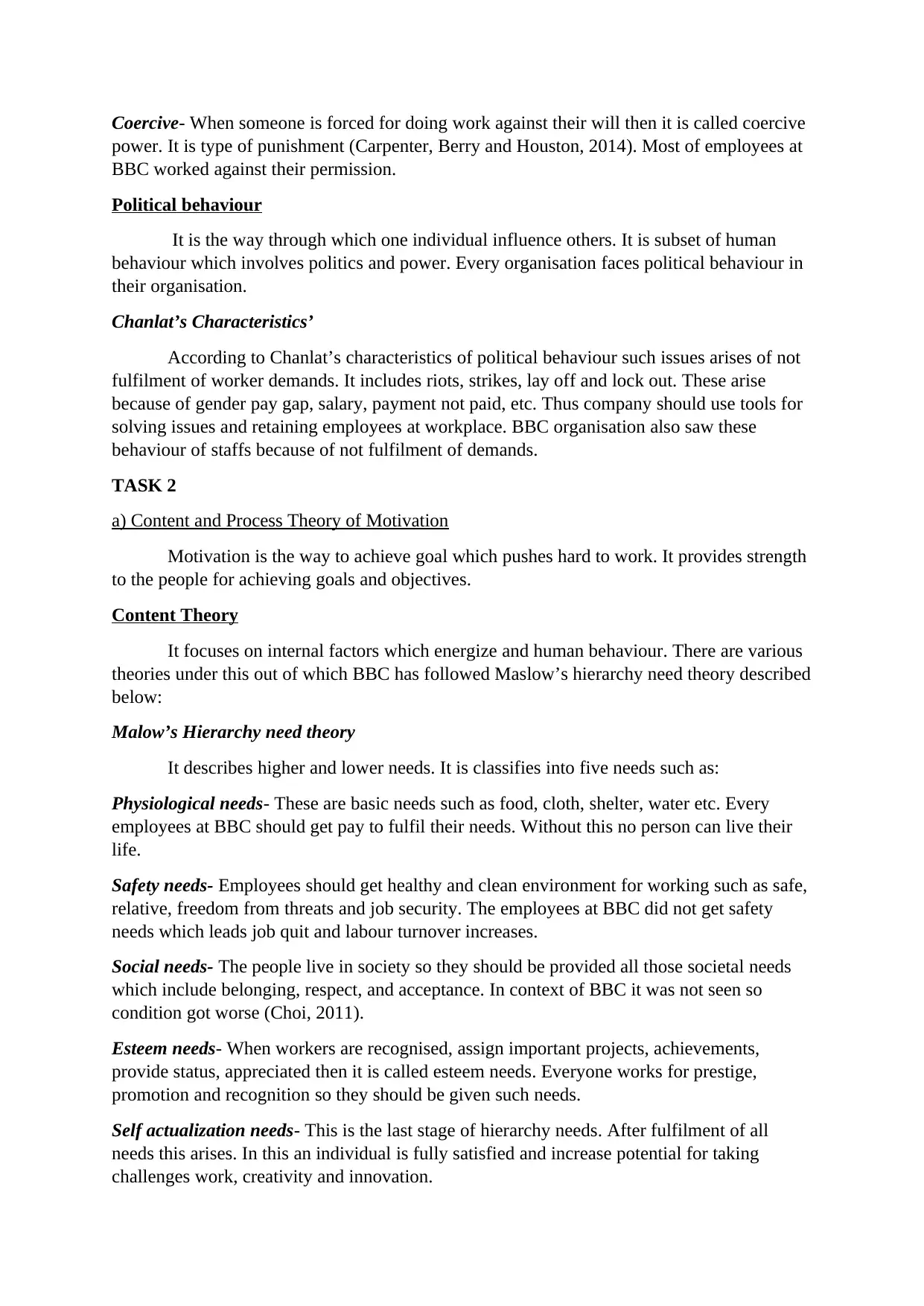
Coercive- When someone is forced for doing work against their will then it is called coercive
power. It is type of punishment (Carpenter, Berry and Houston, 2014). Most of employees at
BBC worked against their permission.
Political behaviour
It is the way through which one individual influence others. It is subset of human
behaviour which involves politics and power. Every organisation faces political behaviour in
their organisation.
Chanlat’s Characteristics’
According to Chanlat’s characteristics of political behaviour such issues arises of not
fulfilment of worker demands. It includes riots, strikes, lay off and lock out. These arise
because of gender pay gap, salary, payment not paid, etc. Thus company should use tools for
solving issues and retaining employees at workplace. BBC organisation also saw these
behaviour of staffs because of not fulfilment of demands.
TASK 2
a) Content and Process Theory of Motivation
Motivation is the way to achieve goal which pushes hard to work. It provides strength
to the people for achieving goals and objectives.
Content Theory
It focuses on internal factors which energize and human behaviour. There are various
theories under this out of which BBC has followed Maslow’s hierarchy need theory described
below:
Malow’s Hierarchy need theory
It describes higher and lower needs. It is classifies into five needs such as:
Physiological needs- These are basic needs such as food, cloth, shelter, water etc. Every
employees at BBC should get pay to fulfil their needs. Without this no person can live their
life.
Safety needs- Employees should get healthy and clean environment for working such as safe,
relative, freedom from threats and job security. The employees at BBC did not get safety
needs which leads job quit and labour turnover increases.
Social needs- The people live in society so they should be provided all those societal needs
which include belonging, respect, and acceptance. In context of BBC it was not seen so
condition got worse (Choi, 2011).
Esteem needs- When workers are recognised, assign important projects, achievements,
provide status, appreciated then it is called esteem needs. Everyone works for prestige,
promotion and recognition so they should be given such needs.
Self actualization needs- This is the last stage of hierarchy needs. After fulfilment of all
needs this arises. In this an individual is fully satisfied and increase potential for taking
challenges work, creativity and innovation.
power. It is type of punishment (Carpenter, Berry and Houston, 2014). Most of employees at
BBC worked against their permission.
Political behaviour
It is the way through which one individual influence others. It is subset of human
behaviour which involves politics and power. Every organisation faces political behaviour in
their organisation.
Chanlat’s Characteristics’
According to Chanlat’s characteristics of political behaviour such issues arises of not
fulfilment of worker demands. It includes riots, strikes, lay off and lock out. These arise
because of gender pay gap, salary, payment not paid, etc. Thus company should use tools for
solving issues and retaining employees at workplace. BBC organisation also saw these
behaviour of staffs because of not fulfilment of demands.
TASK 2
a) Content and Process Theory of Motivation
Motivation is the way to achieve goal which pushes hard to work. It provides strength
to the people for achieving goals and objectives.
Content Theory
It focuses on internal factors which energize and human behaviour. There are various
theories under this out of which BBC has followed Maslow’s hierarchy need theory described
below:
Malow’s Hierarchy need theory
It describes higher and lower needs. It is classifies into five needs such as:
Physiological needs- These are basic needs such as food, cloth, shelter, water etc. Every
employees at BBC should get pay to fulfil their needs. Without this no person can live their
life.
Safety needs- Employees should get healthy and clean environment for working such as safe,
relative, freedom from threats and job security. The employees at BBC did not get safety
needs which leads job quit and labour turnover increases.
Social needs- The people live in society so they should be provided all those societal needs
which include belonging, respect, and acceptance. In context of BBC it was not seen so
condition got worse (Choi, 2011).
Esteem needs- When workers are recognised, assign important projects, achievements,
provide status, appreciated then it is called esteem needs. Everyone works for prestige,
promotion and recognition so they should be given such needs.
Self actualization needs- This is the last stage of hierarchy needs. After fulfilment of all
needs this arises. In this an individual is fully satisfied and increase potential for taking
challenges work, creativity and innovation.
Paraphrase This Document
Need a fresh take? Get an instant paraphrase of this document with our AI Paraphraser
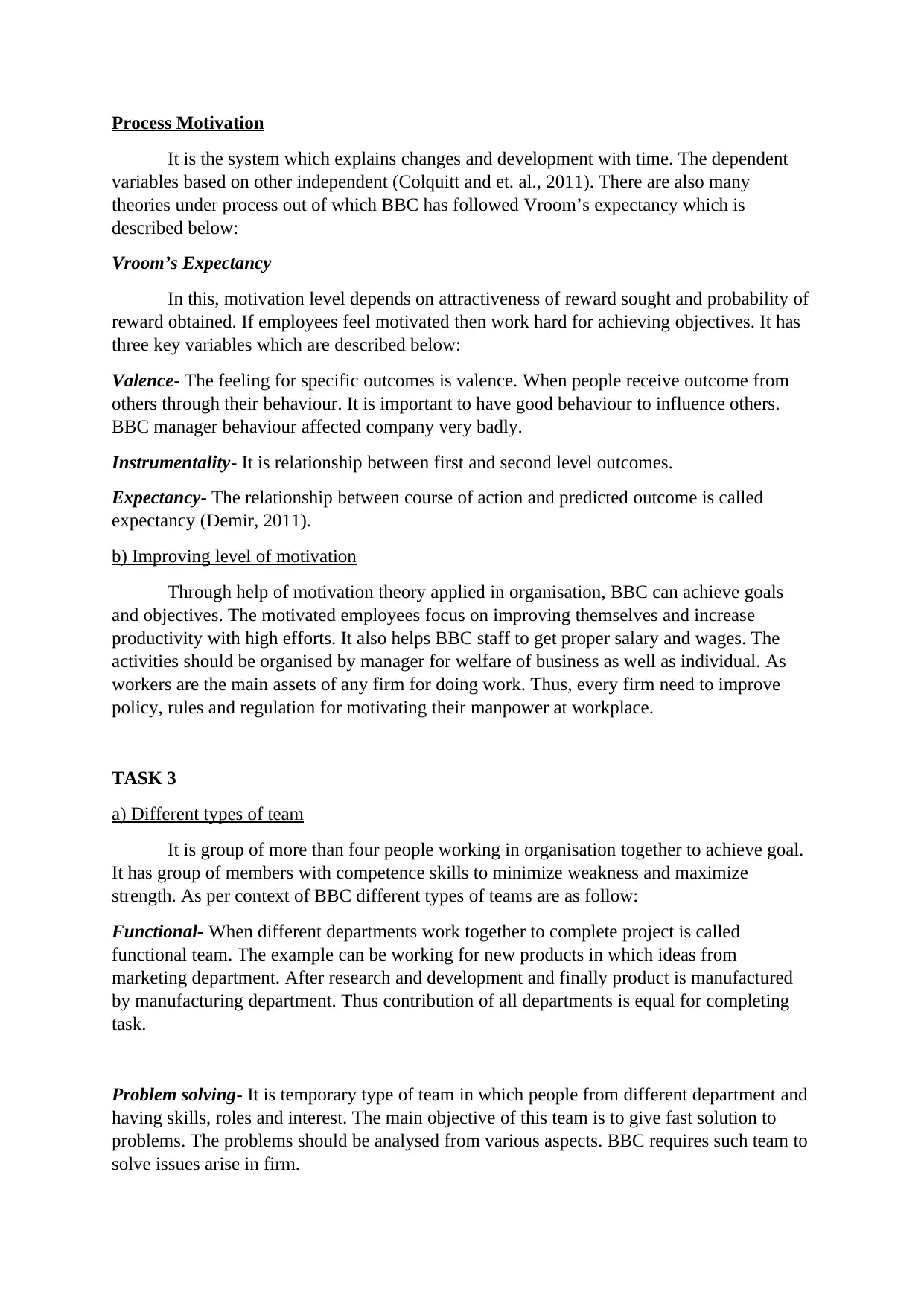
Process Motivation
It is the system which explains changes and development with time. The dependent
variables based on other independent (Colquitt and et. al., 2011). There are also many
theories under process out of which BBC has followed Vroom’s expectancy which is
described below:
Vroom’s Expectancy
In this, motivation level depends on attractiveness of reward sought and probability of
reward obtained. If employees feel motivated then work hard for achieving objectives. It has
three key variables which are described below:
Valence- The feeling for specific outcomes is valence. When people receive outcome from
others through their behaviour. It is important to have good behaviour to influence others.
BBC manager behaviour affected company very badly.
Instrumentality- It is relationship between first and second level outcomes.
Expectancy- The relationship between course of action and predicted outcome is called
expectancy (Demir, 2011).
b) Improving level of motivation
Through help of motivation theory applied in organisation, BBC can achieve goals
and objectives. The motivated employees focus on improving themselves and increase
productivity with high efforts. It also helps BBC staff to get proper salary and wages. The
activities should be organised by manager for welfare of business as well as individual. As
workers are the main assets of any firm for doing work. Thus, every firm need to improve
policy, rules and regulation for motivating their manpower at workplace.
TASK 3
a) Different types of team
It is group of more than four people working in organisation together to achieve goal.
It has group of members with competence skills to minimize weakness and maximize
strength. As per context of BBC different types of teams are as follow:
Functional- When different departments work together to complete project is called
functional team. The example can be working for new products in which ideas from
marketing department. After research and development and finally product is manufactured
by manufacturing department. Thus contribution of all departments is equal for completing
task.
Problem solving- It is temporary type of team in which people from different department and
having skills, roles and interest. The main objective of this team is to give fast solution to
problems. The problems should be analysed from various aspects. BBC requires such team to
solve issues arise in firm.
It is the system which explains changes and development with time. The dependent
variables based on other independent (Colquitt and et. al., 2011). There are also many
theories under process out of which BBC has followed Vroom’s expectancy which is
described below:
Vroom’s Expectancy
In this, motivation level depends on attractiveness of reward sought and probability of
reward obtained. If employees feel motivated then work hard for achieving objectives. It has
three key variables which are described below:
Valence- The feeling for specific outcomes is valence. When people receive outcome from
others through their behaviour. It is important to have good behaviour to influence others.
BBC manager behaviour affected company very badly.
Instrumentality- It is relationship between first and second level outcomes.
Expectancy- The relationship between course of action and predicted outcome is called
expectancy (Demir, 2011).
b) Improving level of motivation
Through help of motivation theory applied in organisation, BBC can achieve goals
and objectives. The motivated employees focus on improving themselves and increase
productivity with high efforts. It also helps BBC staff to get proper salary and wages. The
activities should be organised by manager for welfare of business as well as individual. As
workers are the main assets of any firm for doing work. Thus, every firm need to improve
policy, rules and regulation for motivating their manpower at workplace.
TASK 3
a) Different types of team
It is group of more than four people working in organisation together to achieve goal.
It has group of members with competence skills to minimize weakness and maximize
strength. As per context of BBC different types of teams are as follow:
Functional- When different departments work together to complete project is called
functional team. The example can be working for new products in which ideas from
marketing department. After research and development and finally product is manufactured
by manufacturing department. Thus contribution of all departments is equal for completing
task.
Problem solving- It is temporary type of team in which people from different department and
having skills, roles and interest. The main objective of this team is to give fast solution to
problems. The problems should be analysed from various aspects. BBC requires such team to
solve issues arise in firm.
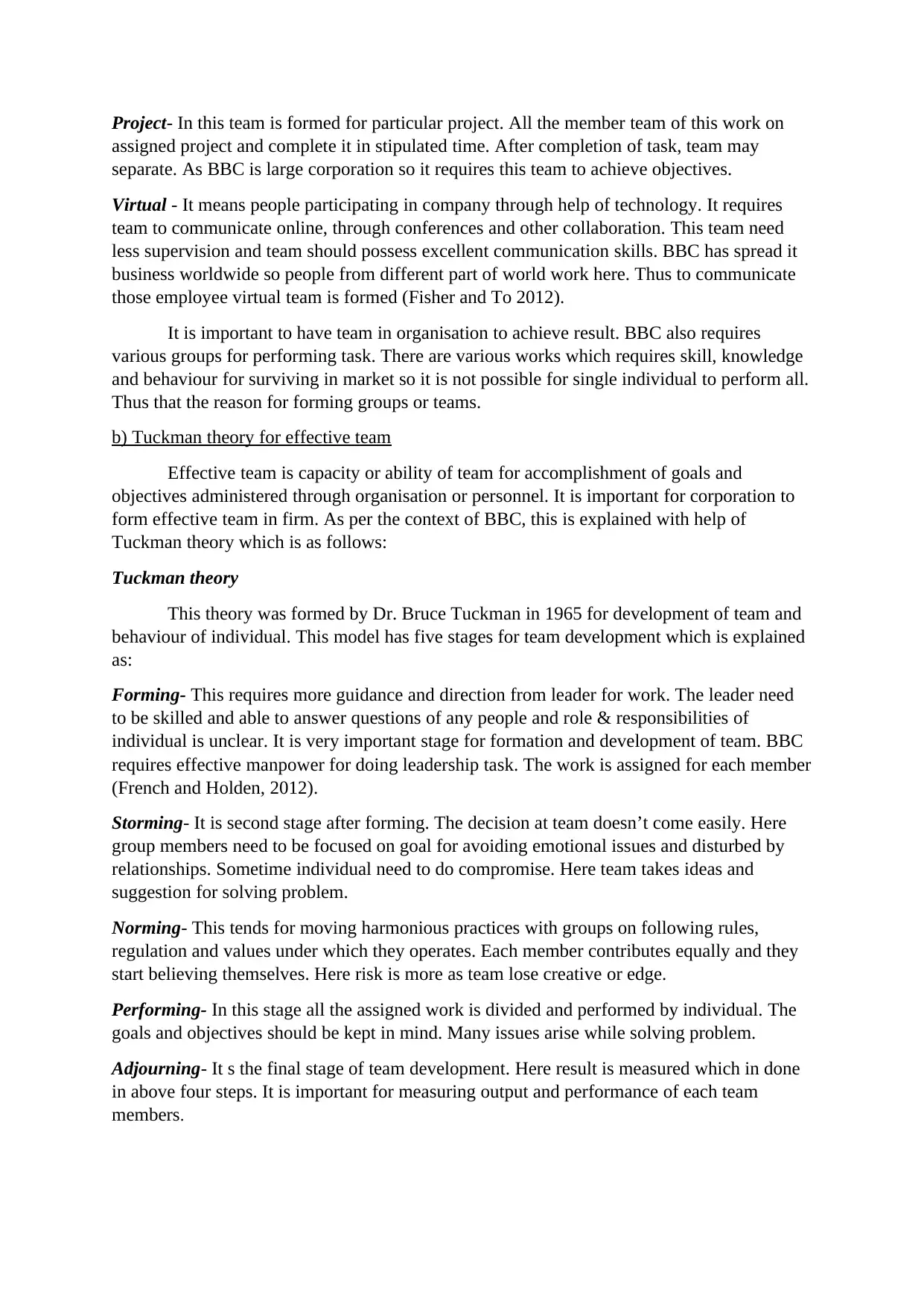
Project- In this team is formed for particular project. All the member team of this work on
assigned project and complete it in stipulated time. After completion of task, team may
separate. As BBC is large corporation so it requires this team to achieve objectives.
Virtual - It means people participating in company through help of technology. It requires
team to communicate online, through conferences and other collaboration. This team need
less supervision and team should possess excellent communication skills. BBC has spread it
business worldwide so people from different part of world work here. Thus to communicate
those employee virtual team is formed (Fisher and To 2012).
It is important to have team in organisation to achieve result. BBC also requires
various groups for performing task. There are various works which requires skill, knowledge
and behaviour for surviving in market so it is not possible for single individual to perform all.
Thus that the reason for forming groups or teams.
b) Tuckman theory for effective team
Effective team is capacity or ability of team for accomplishment of goals and
objectives administered through organisation or personnel. It is important for corporation to
form effective team in firm. As per the context of BBC, this is explained with help of
Tuckman theory which is as follows:
Tuckman theory
This theory was formed by Dr. Bruce Tuckman in 1965 for development of team and
behaviour of individual. This model has five stages for team development which is explained
as:
Forming- This requires more guidance and direction from leader for work. The leader need
to be skilled and able to answer questions of any people and role & responsibilities of
individual is unclear. It is very important stage for formation and development of team. BBC
requires effective manpower for doing leadership task. The work is assigned for each member
(French and Holden, 2012).
Storming- It is second stage after forming. The decision at team doesn’t come easily. Here
group members need to be focused on goal for avoiding emotional issues and disturbed by
relationships. Sometime individual need to do compromise. Here team takes ideas and
suggestion for solving problem.
Norming- This tends for moving harmonious practices with groups on following rules,
regulation and values under which they operates. Each member contributes equally and they
start believing themselves. Here risk is more as team lose creative or edge.
Performing- In this stage all the assigned work is divided and performed by individual. The
goals and objectives should be kept in mind. Many issues arise while solving problem.
Adjourning- It s the final stage of team development. Here result is measured which in done
in above four steps. It is important for measuring output and performance of each team
members.
assigned project and complete it in stipulated time. After completion of task, team may
separate. As BBC is large corporation so it requires this team to achieve objectives.
Virtual - It means people participating in company through help of technology. It requires
team to communicate online, through conferences and other collaboration. This team need
less supervision and team should possess excellent communication skills. BBC has spread it
business worldwide so people from different part of world work here. Thus to communicate
those employee virtual team is formed (Fisher and To 2012).
It is important to have team in organisation to achieve result. BBC also requires
various groups for performing task. There are various works which requires skill, knowledge
and behaviour for surviving in market so it is not possible for single individual to perform all.
Thus that the reason for forming groups or teams.
b) Tuckman theory for effective team
Effective team is capacity or ability of team for accomplishment of goals and
objectives administered through organisation or personnel. It is important for corporation to
form effective team in firm. As per the context of BBC, this is explained with help of
Tuckman theory which is as follows:
Tuckman theory
This theory was formed by Dr. Bruce Tuckman in 1965 for development of team and
behaviour of individual. This model has five stages for team development which is explained
as:
Forming- This requires more guidance and direction from leader for work. The leader need
to be skilled and able to answer questions of any people and role & responsibilities of
individual is unclear. It is very important stage for formation and development of team. BBC
requires effective manpower for doing leadership task. The work is assigned for each member
(French and Holden, 2012).
Storming- It is second stage after forming. The decision at team doesn’t come easily. Here
group members need to be focused on goal for avoiding emotional issues and disturbed by
relationships. Sometime individual need to do compromise. Here team takes ideas and
suggestion for solving problem.
Norming- This tends for moving harmonious practices with groups on following rules,
regulation and values under which they operates. Each member contributes equally and they
start believing themselves. Here risk is more as team lose creative or edge.
Performing- In this stage all the assigned work is divided and performed by individual. The
goals and objectives should be kept in mind. Many issues arise while solving problem.
Adjourning- It s the final stage of team development. Here result is measured which in done
in above four steps. It is important for measuring output and performance of each team
members.
⊘ This is a preview!⊘
Do you want full access?
Subscribe today to unlock all pages.

Trusted by 1+ million students worldwide
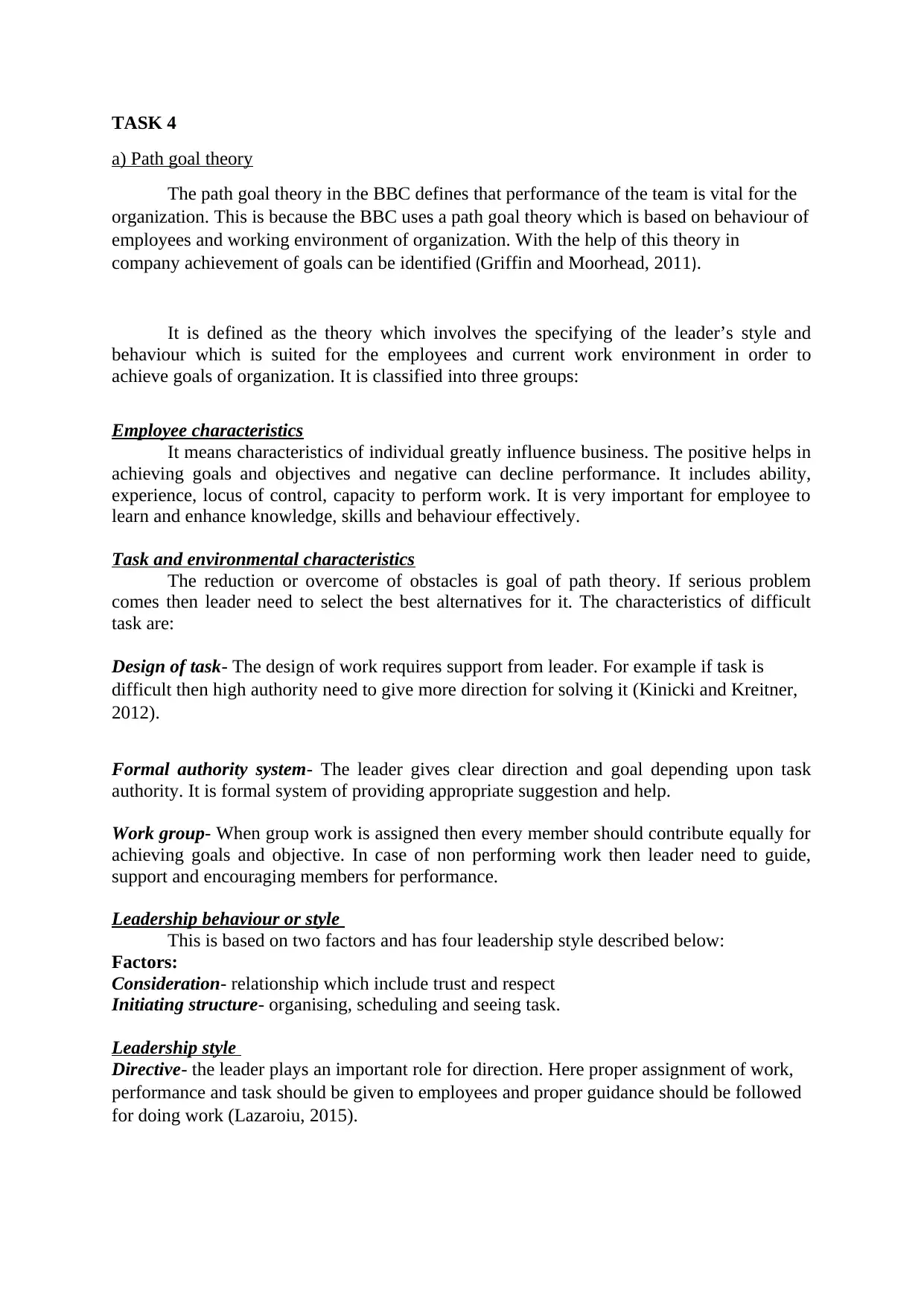
TASK 4
a) Path goal theory
The path goal theory in the BBC defines that performance of the team is vital for the
organization. This is because the BBC uses a path goal theory which is based on behaviour of
employees and working environment of organization. With the help of this theory in
company achievement of goals can be identified (Griffin and Moorhead, 2011).
It is defined as the theory which involves the specifying of the leader’s style and
behaviour which is suited for the employees and current work environment in order to
achieve goals of organization. It is classified into three groups:
Employee characteristics
It means characteristics of individual greatly influence business. The positive helps in
achieving goals and objectives and negative can decline performance. It includes ability,
experience, locus of control, capacity to perform work. It is very important for employee to
learn and enhance knowledge, skills and behaviour effectively.
Task and environmental characteristics
The reduction or overcome of obstacles is goal of path theory. If serious problem
comes then leader need to select the best alternatives for it. The characteristics of difficult
task are:
Design of task- The design of work requires support from leader. For example if task is
difficult then high authority need to give more direction for solving it (Kinicki and Kreitner,
2012).
Formal authority system- The leader gives clear direction and goal depending upon task
authority. It is formal system of providing appropriate suggestion and help.
Work group- When group work is assigned then every member should contribute equally for
achieving goals and objective. In case of non performing work then leader need to guide,
support and encouraging members for performance.
Leadership behaviour or style
This is based on two factors and has four leadership style described below:
Factors:
Consideration- relationship which include trust and respect
Initiating structure- organising, scheduling and seeing task.
Leadership style
Directive- the leader plays an important role for direction. Here proper assignment of work,
performance and task should be given to employees and proper guidance should be followed
for doing work (Lazaroiu, 2015).
a) Path goal theory
The path goal theory in the BBC defines that performance of the team is vital for the
organization. This is because the BBC uses a path goal theory which is based on behaviour of
employees and working environment of organization. With the help of this theory in
company achievement of goals can be identified (Griffin and Moorhead, 2011).
It is defined as the theory which involves the specifying of the leader’s style and
behaviour which is suited for the employees and current work environment in order to
achieve goals of organization. It is classified into three groups:
Employee characteristics
It means characteristics of individual greatly influence business. The positive helps in
achieving goals and objectives and negative can decline performance. It includes ability,
experience, locus of control, capacity to perform work. It is very important for employee to
learn and enhance knowledge, skills and behaviour effectively.
Task and environmental characteristics
The reduction or overcome of obstacles is goal of path theory. If serious problem
comes then leader need to select the best alternatives for it. The characteristics of difficult
task are:
Design of task- The design of work requires support from leader. For example if task is
difficult then high authority need to give more direction for solving it (Kinicki and Kreitner,
2012).
Formal authority system- The leader gives clear direction and goal depending upon task
authority. It is formal system of providing appropriate suggestion and help.
Work group- When group work is assigned then every member should contribute equally for
achieving goals and objective. In case of non performing work then leader need to guide,
support and encouraging members for performance.
Leadership behaviour or style
This is based on two factors and has four leadership style described below:
Factors:
Consideration- relationship which include trust and respect
Initiating structure- organising, scheduling and seeing task.
Leadership style
Directive- the leader plays an important role for direction. Here proper assignment of work,
performance and task should be given to employees and proper guidance should be followed
for doing work (Lazaroiu, 2015).
Paraphrase This Document
Need a fresh take? Get an instant paraphrase of this document with our AI Paraphraser
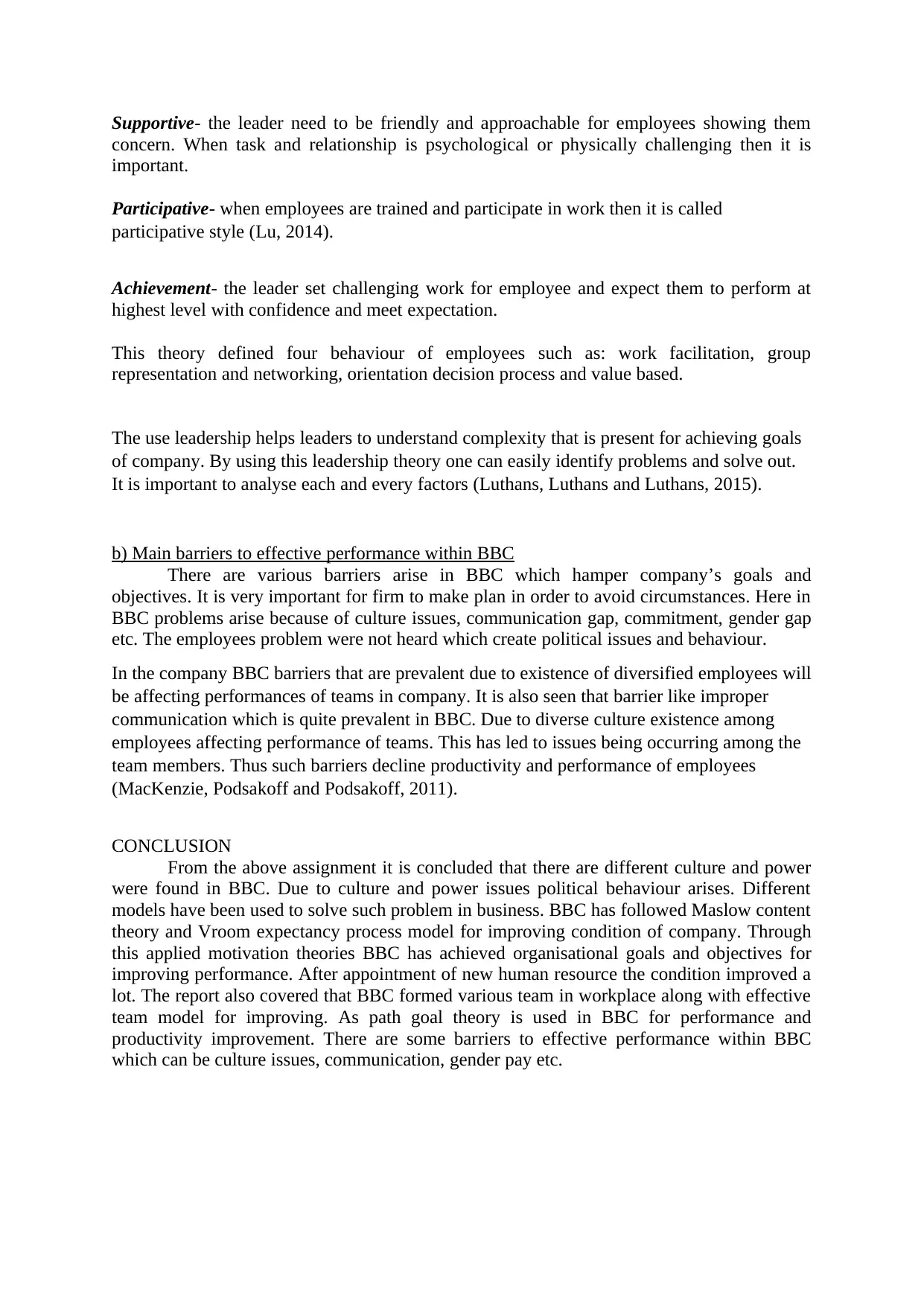
Supportive- the leader need to be friendly and approachable for employees showing them
concern. When task and relationship is psychological or physically challenging then it is
important.
Participative- when employees are trained and participate in work then it is called
participative style (Lu, 2014).
Achievement- the leader set challenging work for employee and expect them to perform at
highest level with confidence and meet expectation.
This theory defined four behaviour of employees such as: work facilitation, group
representation and networking, orientation decision process and value based.
The use leadership helps leaders to understand complexity that is present for achieving goals
of company. By using this leadership theory one can easily identify problems and solve out.
It is important to analyse each and every factors (Luthans, Luthans and Luthans, 2015).
b) Main barriers to effective performance within BBC
There are various barriers arise in BBC which hamper company’s goals and
objectives. It is very important for firm to make plan in order to avoid circumstances. Here in
BBC problems arise because of culture issues, communication gap, commitment, gender gap
etc. The employees problem were not heard which create political issues and behaviour.
In the company BBC barriers that are prevalent due to existence of diversified employees will
be affecting performances of teams in company. It is also seen that barrier like improper
communication which is quite prevalent in BBC. Due to diverse culture existence among
employees affecting performance of teams. This has led to issues being occurring among the
team members. Thus such barriers decline productivity and performance of employees
(MacKenzie, Podsakoff and Podsakoff, 2011).
CONCLUSION
From the above assignment it is concluded that there are different culture and power
were found in BBC. Due to culture and power issues political behaviour arises. Different
models have been used to solve such problem in business. BBC has followed Maslow content
theory and Vroom expectancy process model for improving condition of company. Through
this applied motivation theories BBC has achieved organisational goals and objectives for
improving performance. After appointment of new human resource the condition improved a
lot. The report also covered that BBC formed various team in workplace along with effective
team model for improving. As path goal theory is used in BBC for performance and
productivity improvement. There are some barriers to effective performance within BBC
which can be culture issues, communication, gender pay etc.
concern. When task and relationship is psychological or physically challenging then it is
important.
Participative- when employees are trained and participate in work then it is called
participative style (Lu, 2014).
Achievement- the leader set challenging work for employee and expect them to perform at
highest level with confidence and meet expectation.
This theory defined four behaviour of employees such as: work facilitation, group
representation and networking, orientation decision process and value based.
The use leadership helps leaders to understand complexity that is present for achieving goals
of company. By using this leadership theory one can easily identify problems and solve out.
It is important to analyse each and every factors (Luthans, Luthans and Luthans, 2015).
b) Main barriers to effective performance within BBC
There are various barriers arise in BBC which hamper company’s goals and
objectives. It is very important for firm to make plan in order to avoid circumstances. Here in
BBC problems arise because of culture issues, communication gap, commitment, gender gap
etc. The employees problem were not heard which create political issues and behaviour.
In the company BBC barriers that are prevalent due to existence of diversified employees will
be affecting performances of teams in company. It is also seen that barrier like improper
communication which is quite prevalent in BBC. Due to diverse culture existence among
employees affecting performance of teams. This has led to issues being occurring among the
team members. Thus such barriers decline productivity and performance of employees
(MacKenzie, Podsakoff and Podsakoff, 2011).
CONCLUSION
From the above assignment it is concluded that there are different culture and power
were found in BBC. Due to culture and power issues political behaviour arises. Different
models have been used to solve such problem in business. BBC has followed Maslow content
theory and Vroom expectancy process model for improving condition of company. Through
this applied motivation theories BBC has achieved organisational goals and objectives for
improving performance. After appointment of new human resource the condition improved a
lot. The report also covered that BBC formed various team in workplace along with effective
team model for improving. As path goal theory is used in BBC for performance and
productivity improvement. There are some barriers to effective performance within BBC
which can be culture issues, communication, gender pay etc.
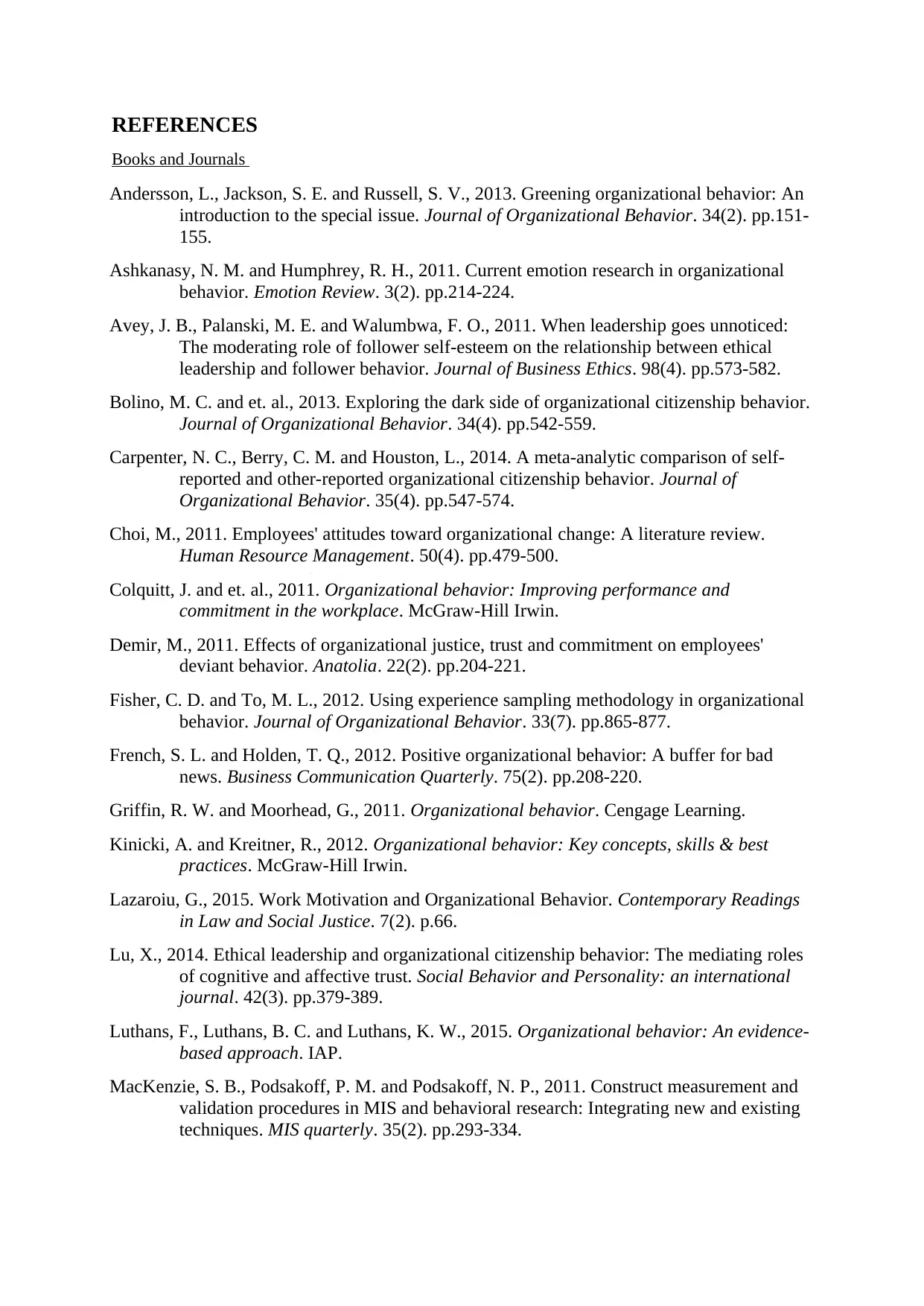
REFERENCES
Books and Journals
Andersson, L., Jackson, S. E. and Russell, S. V., 2013. Greening organizational behavior: An
introduction to the special issue. Journal of Organizational Behavior. 34(2). pp.151-
155.
Ashkanasy, N. M. and Humphrey, R. H., 2011. Current emotion research in organizational
behavior. Emotion Review. 3(2). pp.214-224.
Avey, J. B., Palanski, M. E. and Walumbwa, F. O., 2011. When leadership goes unnoticed:
The moderating role of follower self-esteem on the relationship between ethical
leadership and follower behavior. Journal of Business Ethics. 98(4). pp.573-582.
Bolino, M. C. and et. al., 2013. Exploring the dark side of organizational citizenship behavior.
Journal of Organizational Behavior. 34(4). pp.542-559.
Carpenter, N. C., Berry, C. M. and Houston, L., 2014. A meta‐analytic comparison of self‐
reported and other‐reported organizational citizenship behavior. Journal of
Organizational Behavior. 35(4). pp.547-574.
Choi, M., 2011. Employees' attitudes toward organizational change: A literature review.
Human Resource Management. 50(4). pp.479-500.
Colquitt, J. and et. al., 2011. Organizational behavior: Improving performance and
commitment in the workplace. McGraw-Hill Irwin.
Demir, M., 2011. Effects of organizational justice, trust and commitment on employees'
deviant behavior. Anatolia. 22(2). pp.204-221.
Fisher, C. D. and To, M. L., 2012. Using experience sampling methodology in organizational
behavior. Journal of Organizational Behavior. 33(7). pp.865-877.
French, S. L. and Holden, T. Q., 2012. Positive organizational behavior: A buffer for bad
news. Business Communication Quarterly. 75(2). pp.208-220.
Griffin, R. W. and Moorhead, G., 2011. Organizational behavior. Cengage Learning.
Kinicki, A. and Kreitner, R., 2012. Organizational behavior: Key concepts, skills & best
practices. McGraw-Hill Irwin.
Lazaroiu, G., 2015. Work Motivation and Organizational Behavior. Contemporary Readings
in Law and Social Justice. 7(2). p.66.
Lu, X., 2014. Ethical leadership and organizational citizenship behavior: The mediating roles
of cognitive and affective trust. Social Behavior and Personality: an international
journal. 42(3). pp.379-389.
Luthans, F., Luthans, B. C. and Luthans, K. W., 2015. Organizational behavior: An evidence-
based approach. IAP.
MacKenzie, S. B., Podsakoff, P. M. and Podsakoff, N. P., 2011. Construct measurement and
validation procedures in MIS and behavioral research: Integrating new and existing
techniques. MIS quarterly. 35(2). pp.293-334.
Books and Journals
Andersson, L., Jackson, S. E. and Russell, S. V., 2013. Greening organizational behavior: An
introduction to the special issue. Journal of Organizational Behavior. 34(2). pp.151-
155.
Ashkanasy, N. M. and Humphrey, R. H., 2011. Current emotion research in organizational
behavior. Emotion Review. 3(2). pp.214-224.
Avey, J. B., Palanski, M. E. and Walumbwa, F. O., 2011. When leadership goes unnoticed:
The moderating role of follower self-esteem on the relationship between ethical
leadership and follower behavior. Journal of Business Ethics. 98(4). pp.573-582.
Bolino, M. C. and et. al., 2013. Exploring the dark side of organizational citizenship behavior.
Journal of Organizational Behavior. 34(4). pp.542-559.
Carpenter, N. C., Berry, C. M. and Houston, L., 2014. A meta‐analytic comparison of self‐
reported and other‐reported organizational citizenship behavior. Journal of
Organizational Behavior. 35(4). pp.547-574.
Choi, M., 2011. Employees' attitudes toward organizational change: A literature review.
Human Resource Management. 50(4). pp.479-500.
Colquitt, J. and et. al., 2011. Organizational behavior: Improving performance and
commitment in the workplace. McGraw-Hill Irwin.
Demir, M., 2011. Effects of organizational justice, trust and commitment on employees'
deviant behavior. Anatolia. 22(2). pp.204-221.
Fisher, C. D. and To, M. L., 2012. Using experience sampling methodology in organizational
behavior. Journal of Organizational Behavior. 33(7). pp.865-877.
French, S. L. and Holden, T. Q., 2012. Positive organizational behavior: A buffer for bad
news. Business Communication Quarterly. 75(2). pp.208-220.
Griffin, R. W. and Moorhead, G., 2011. Organizational behavior. Cengage Learning.
Kinicki, A. and Kreitner, R., 2012. Organizational behavior: Key concepts, skills & best
practices. McGraw-Hill Irwin.
Lazaroiu, G., 2015. Work Motivation and Organizational Behavior. Contemporary Readings
in Law and Social Justice. 7(2). p.66.
Lu, X., 2014. Ethical leadership and organizational citizenship behavior: The mediating roles
of cognitive and affective trust. Social Behavior and Personality: an international
journal. 42(3). pp.379-389.
Luthans, F., Luthans, B. C. and Luthans, K. W., 2015. Organizational behavior: An evidence-
based approach. IAP.
MacKenzie, S. B., Podsakoff, P. M. and Podsakoff, N. P., 2011. Construct measurement and
validation procedures in MIS and behavioral research: Integrating new and existing
techniques. MIS quarterly. 35(2). pp.293-334.
⊘ This is a preview!⊘
Do you want full access?
Subscribe today to unlock all pages.

Trusted by 1+ million students worldwide
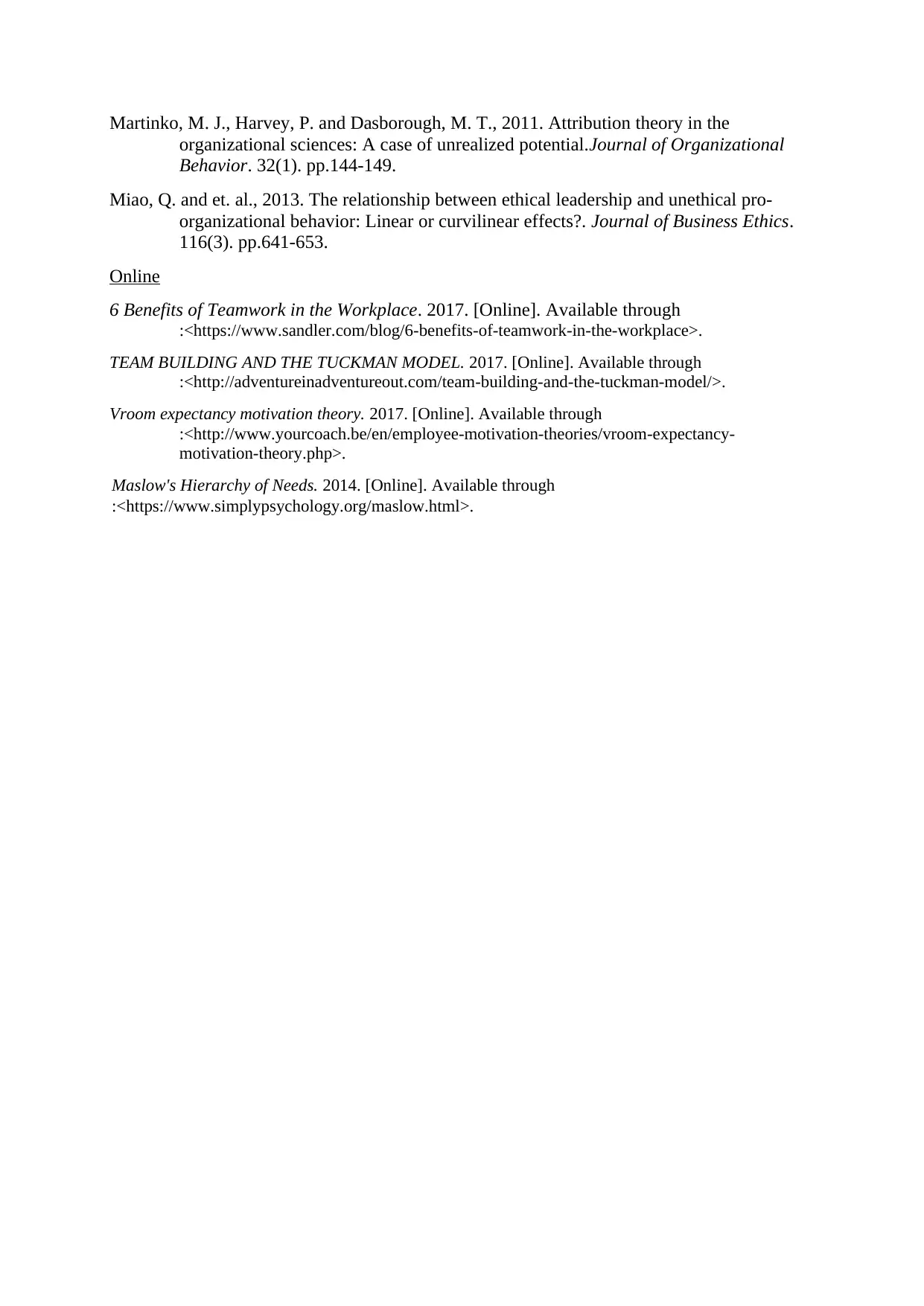
Martinko, M. J., Harvey, P. and Dasborough, M. T., 2011. Attribution theory in the
organizational sciences: A case of unrealized potential.Journal of Organizational
Behavior. 32(1). pp.144-149.
Miao, Q. and et. al., 2013. The relationship between ethical leadership and unethical pro-
organizational behavior: Linear or curvilinear effects?. Journal of Business Ethics.
116(3). pp.641-653.
Online
6 Benefits of Teamwork in the Workplace. 2017. [Online]. Available through
:<https://www.sandler.com/blog/6-benefits-of-teamwork-in-the-workplace>.
TEAM BUILDING AND THE TUCKMAN MODEL. 2017. [Online]. Available through
:<http://adventureinadventureout.com/team-building-and-the-tuckman-model/>.
Vroom expectancy motivation theory. 2017. [Online]. Available through
:<http://www.yourcoach.be/en/employee-motivation-theories/vroom-expectancy-
motivation-theory.php>.
Maslow's Hierarchy of Needs. 2014. [Online]. Available through
:<https://www.simplypsychology.org/maslow.html>.
organizational sciences: A case of unrealized potential.Journal of Organizational
Behavior. 32(1). pp.144-149.
Miao, Q. and et. al., 2013. The relationship between ethical leadership and unethical pro-
organizational behavior: Linear or curvilinear effects?. Journal of Business Ethics.
116(3). pp.641-653.
Online
6 Benefits of Teamwork in the Workplace. 2017. [Online]. Available through
:<https://www.sandler.com/blog/6-benefits-of-teamwork-in-the-workplace>.
TEAM BUILDING AND THE TUCKMAN MODEL. 2017. [Online]. Available through
:<http://adventureinadventureout.com/team-building-and-the-tuckman-model/>.
Vroom expectancy motivation theory. 2017. [Online]. Available through
:<http://www.yourcoach.be/en/employee-motivation-theories/vroom-expectancy-
motivation-theory.php>.
Maslow's Hierarchy of Needs. 2014. [Online]. Available through
:<https://www.simplypsychology.org/maslow.html>.
Paraphrase This Document
Need a fresh take? Get an instant paraphrase of this document with our AI Paraphraser

1 out of 11
Related Documents
Your All-in-One AI-Powered Toolkit for Academic Success.
+13062052269
info@desklib.com
Available 24*7 on WhatsApp / Email
![[object Object]](/_next/static/media/star-bottom.7253800d.svg)
Unlock your academic potential
Copyright © 2020–2026 A2Z Services. All Rights Reserved. Developed and managed by ZUCOL.




